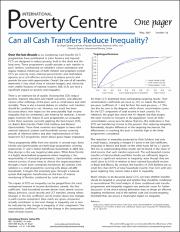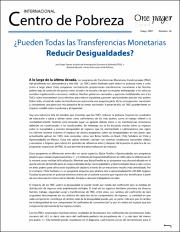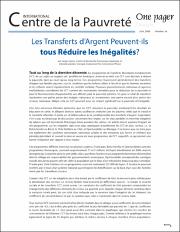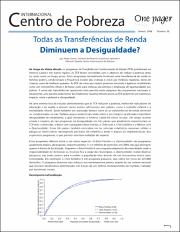Please use this identifier to cite or link to this item:
https://repositorio.ipea.gov.br/handle/11058/15185Files in This Item:
| File | Description | Size | Format | |
|---|---|---|---|---|
| en_IPCOnePager36.pdf | 45.27 kB | Adobe PDF |  View/Open | |
| es_IPCOnePager36.pdf | 125.55 kB | Adobe PDF |  View/Open | |
| fr_IPCOnePager36.pdf | 93.35 kB | Adobe PDF |  View/Open | |
| pt-br_IPCOnePager36.pdf | 53.3 kB | Adobe PDF |  View/Open |
| Title: | Can all Cash Transfers Reduce Inequality? |
| Other Titles: | ¿Pueden Todas las Transferencias Monetarias Reducir Desigualdades? Les Transferts d’Argent Peuvent-ils tous Réduire les Inégalités? Todas as Transferências de Renda Diminuem a Desigualdade? |
| Authors: | Soares, Sergei Suarez Dillon Zepeda, Eduardo |
| Abstract: | Over the last decade Targeting performance or so, Conditional Cash Transfer (CCT) programmes have proliferated in Latin America and beyond. CCTs are designed to reduce poverty, both in the short and the long term. These programmes usually provide a cash transfer to poor families, conditioned on children’s school attendance and regular medical checks-ups of both children and pregnant women. CCTs are seen by many national governments and multilateral agencies as a cost-effective instrument to reduce poverty and provide the poor with opportunities. Overall, the sum of all transfers represents a very small share of national budgets and, obviously, even smaller fractions of national incomes. Still, CCTs can have a significant impact on poverty and inequality. (...) Ao longo da última década, os programas de Transferências Condicionadas de Renda (TCR) proliferaram na |
| metadata.dc.rights.holder: | International Policy Centre for Inclusive Growth United Nations Development Programme |
| metadata.dc.rights.license: | O texto e dados desta publicação podem ser reproduzidos desde que as fontes sejam citadas. Reproduções com fins comerciais são proibidas. |
| metadata.dc.type: | One Pager |
| Appears in Collections: | Publicações do IPC-IG |
Items in DSpace are protected by copyright, with all rights reserved, unless otherwise indicated.

